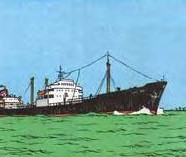Swimming at the Paris PCBeach
To cope with the inertia of the prefect of police of Paris and the mayors of Paris and the Parisian suburbs, Robin des Bois (Robin Hood) informs the urban fishermen that the barbells, roaches, eels, breams, rudds, brills, chubs and the gudgeons who were the subject of a sampling and PCB analysis contain elevated concentrations of these cancerous micro pollutants and endocrinal disrupters.
This information is available on the site pollutions.eaufrance.fr (French only) and merit an attentive reading to which the experts at Robin des Bois are dedicated. The results of this active sampling campaign by the Minister for Ecology confirm the worries of Robin des Bois. In effect, for some years, and notably in its fourth edition of “The Atlas of Inland Sites Polluted by PCB,” published in February 2010, the NGO speaks of the “Parisian miracle,” thanks to which the fish, by swimming in the PCB, could be exempt from its effects.
Swimming at the Paris PCBeach
To cope with the inertia of the prefect of police of Paris and the mayors of Paris and the Parisian suburbs, Robin des Bois (Robin Hood) informs the urban fishermen that the barbells, roaches, eels, breams, rudds, brills, chubs and the gudgeons who were the subject of a sampling and PCB analysis contain elevated concentrations of these cancerous micro pollutants and endocrinal disrupters.
This information is available on the site pollutions.eaufrance.fr (French only) and merit an attentive reading to which the experts at Robin des Bois are dedicated. The results of this active sampling campaign by the Minister for Ecology confirm the worries of Robin des Bois. In effect, for some years, and notably in its fourth edition of “The Atlas of Inland Sites Polluted by PCB,” published in February 2010, the NGO speaks of the “Parisian miracle,” thanks to which the fish, by swimming in the PCB, could be exempt from its effects.
(Français) Robin des Bois conseille aux pêcheurs à la ligne d’arrêter de s’empoisonner dans le Nord-Pas-de-Calais
(Français) Robin des Bois conseille aux pêcheurs à la ligne d’arrêter de s’empoisonner dans le Nord-Pas-de-Calais
“Shipbreaking” #19
Between January 1st and April 4th 2010, 233 ships were sent to be demolished. The rhythm remains elevated, with 18 ships per week. In number of ships to be demolished as well as tonnage, India, with 120 ships (42%), remains destination number 1 before Bangladesh with 55 (24%), Pakistan with 25 (11%), and China with 23 (9%). The accumulated demolition will permit the recycling of nearly 2 million tons of metal.
The crisis is over !
The prices offered by the demolition yards have significantly increased and continue to increase in the yards of the Indian subcontinent, but also in China; they have reached $400, even $500 for oil tankers and more for ships containing stainless steel. The record of the trimester was obtained by the Norwegian chemical tanker Spirit, bought for $780 per ton by an Indian yard, a price rarely reached even in 2008.










